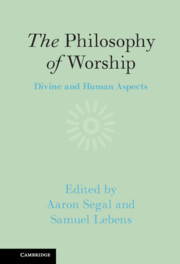2 - The Metaethics of Worship
from Part I - Two Introductions
Published online by Cambridge University Press: 09 January 2025
Summary
A philosophical account of worship will answer at least two questions: the constitutive question of what worship is, and the normative question of what normative standards govern worship. The questions are related because what normative standards govern worship depends on whether worship consists primarily of some attitude or some action. This chapter briefly surveys the theoretical terrain of answers to these questions, with special attention to identifying the minimal conditions under which worship is fitting or supported by reasons.
- Type
- Chapter
- Information
- The Philosophy of WorshipDivine and Human Aspects, pp. 16 - 28Publisher: Cambridge University PressPrint publication year: 2025

